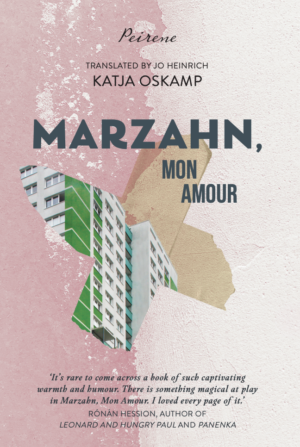You have no items in your cart. Want to get some nice things?
Go shopping
In the late ’70s the German Democratic Republic undertook a massive social engineering project, utopian in scope, to provide decent housing for every East German. In just thirteen years, the GDR built three million homes in tower blocks of precast concrete panels known as plattenbau – whole zones of them, with parks and greenways, markets, schools, and medical centers – in the Marzahn district of Berlin. Though imposing and austere compared to more traditional architecture, they were modern and clean, a big step up from the rundown housing many East Germans had lived in. Families moved in and created coops and social clubs. After Reunification in 1990, though, many of the children who’d grown up there left to live and work elsewhere, leaving a mostly older demographic. Refugees chose to settle there too. This is the Marzahn that the Berlin playwright and fiction writer Katja Oskamp captures in her second novel, Marzahn, Mon Amour.
Oskamp’s narrator, a Berlin writer, is experiencing an existential crisis. At 44 she finds herself in her “middle years . . . neither old nor young” and her writing “more than a little iffy.” Her child has left home, her older husband is ailing, and the attitudes of the people around her are beginning to annoy her. “I was carrying something bitter within me,” she says, “completing the invisibility that befalls women over forty.” When she decides to learn chiropody, to give herself “worthwhile” work, her friends react with “revulsion, incomprehension, and, the hardest to bear, sympathy.” If being a writer is the greater height, where lower to fall than the foot of an eighteen-story tower block in a maligned district of Berlin and, lower still, the feet of those who need to have them treated for various injuries and conditions? Is there anywhere to go but up?
In the answer lies the considerable charm of this novel. Via short chapters that function as vignettes, various Marzahn residents come to the narrator’s chiropody chair – her “pink throne” – to offload while she washes and massages their feet. She deals with their bunions, hammertoes, and ingrown nails, weaving their stories around her own, around those of her coworkers and their children. Oskamp herself is a trained podiatrist who began working in Marzahn in 2015, and her novel originally carried the subtitle A Chiropodist’s Tales. As a selection of the Berlin Reads One Book campaign, it has probably sparked a few debates about whether Marzahn deserves its reputation as a zone that tourists should avoid for its high crime rate, or whether, as a 2014 Open Societies Foundation report on the district attests, the crime is largely exaggerated. “It’s hard to shift preconceptions about the prefab housing estates in East Berlin,” Oskamp writes, and nowhere in her book will readers find the skinheads or neo-Nazis that visitors are warned about. There are some unpleasant characters, such as the arrogant Herr Pietsch, a “walking cliché” who boasts about his many affairs and never fails to try to proposition the narrator, but they are outnumbered by the customers whose quirks delight, such as Frau Bonkat, one of Marzahn’s first inhabitants, who arrived as a refugee but exhibits no self-pity despite the terrible condition of her feet.
One of the things I appreciated about the novel – it reads more like a memoir – is its attention to the work of chiropody, to the tools of a trade whose customers nearly always apologize for the state of their feet. “It makes no difference what condition they’re in. It’s all new and unfamiliar; the contact is a little too intimate; it’s embarrassing – all this is reflected in the apology.” Every client receives a foot bath prior to the real work of removing calluses, pushing back the cuticles, suctioning dead skin, dealing with fungus, and so on. “Biblical themes don’t necessarily enter my conversation with [a client]; nor do I dry her feet with my hair as Mary did,” writes Oskamp. Maybe not, but the book makes clear that there is value in mixing with a variety of individuals, even when you don’t always particularly care for them. There is also value in having your feet cared for by a professional. I finished Marzahn, Mon Amour resolved to visit a chiropodist.
by Katja Oskamp
Translated from the German by Jo Heinrich
Peirene Press, 144 pages
Beth Spencer
Beth Spencer founded Bear Star Press (1997-2019) and is the author of The Cloud Museum, a book of poems from Sixteen Rivers Press. Other work has appeared in Winning Writers, Split This Rock, Best Microfiction 2020, Tin House, The Guardian, Litro, and elsewhere. She splits her time between Cohasset and Noyo, California, with her husband and dog.




